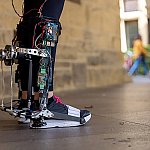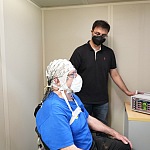You are here
December 20, 2022
2022 Research Highlights — Human Health Advances
Disease Prevention, Diagnosis, and Treatment
With NIH support, scientists across the United States and around the world conduct wide-ranging research to discover ways to enhance health, lengthen life, and reduce illness and disability. Groundbreaking NIH-funded research often receives top scientific honors. In 2022, these honors included two NIH-supported scientists who received Nobel Prizes. Here’s just a small sample of the NIH-supported human health advances in 2022. For more health and medical research findings from NIH, visit NIH Research Matters.
Printer-friendly version of full 2022 NIH Research Highlights








